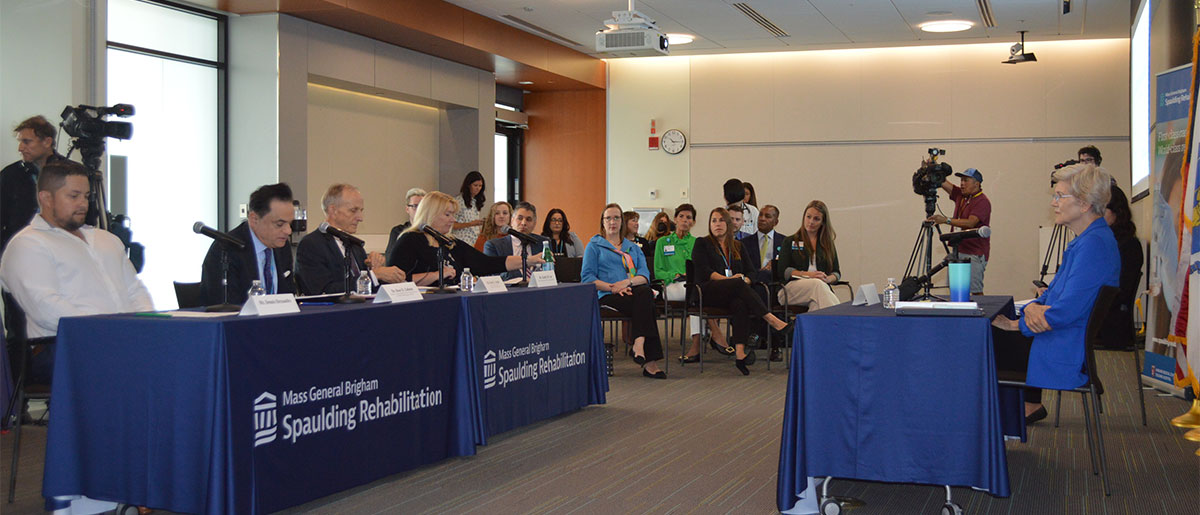Senator Warren Hosts Forum with Spaulding Rehabilitation and Home Base Program to Spotlight Blast Overpressure Injuries
As part of ongoing efforts to highlight the critical need to advance the care and research of traumatic brain injuries and possible connections to overpressure blast injuries, Senator Elizabeth Warren (D-Mass.) hosted a forum at Spaulding Rehabilitation Hospital in Charlestown in collaboration with the Home Base Program.
The public forum welcomed from the Department of Defense Kathy Lee, Director of Warfighter Brain Health Policy; Dr. David Smith, Deputy Assistant Secretary of Defense for Health Readiness Policy and Oversight; Dr. Ross Zafonte, President of Spaulding Rehabilitation and Chief of Traumatic Brain Injury; and Health & Wellness for Home Base and veteran with 22 years in the US Army and Home Base participant Dennis Hernandez.

Blast overpressure injuries and the connection to traumatic brain injury in the military and veterans have shown a strong correlation in recent studies. The injuries caused by blast waves through the body from armaments and other means can be devastating. However, many of the longer-term impacts including co-morbidities related to mental health, cancers, Parkinson’s and other chronic diseases is still not fully understood, limiting the care options available.
“The consequences of blast exposure have been devastating: suicide, depression, seizures, and more,” said Senator Warren. “Congress has an obligation to use every tool we have to give service members the care they deserve and continue to study the long-term effects of exposure to blast overpressure.”
The ongoing research building on understanding of blast waves and impacts in the military has been growing, however significant gaps still exist on the longitudinal understanding. There is also a need to understand the impact of repetitive exposure.
Dr. Zafonte shared with the forum, “While we cannot change our service members prior brain injury and bodily exposures, we have an opportunity to affect change and improve long-term brain and body health by identifying risk factors and creating methods to improve health outcomes. We need to treat and prevent what we can now, while innovating further to create more impactful mitigation measures for our nation’s heroes. Thus, we need a comprehensive approach. We look forward to working with the Department of Defense to provide care to those already affected and most in need, while using the breadth and depth of the Mass General Brigham to build out research-based mitigation measures that the Department of Defense can use to support all service members.”
According to a July 2024 Department of Defense Report on Incidence of Military Suicides by Military Job Code, service members whose jobs exposes them repeatedly to blasts have among the highest suicide rates. Between 2011 and 2022, the Department of Defense identified 5,997 Service members who died by suicide. Explosive ordnance disposal team members had the highest in training and on deployment, Special Operations personnel operate heavy weaponry that exposes them to blast overpressure and mild to moderate traumatic brain injuries that may go undiagnosed, untreated, and otherwise not mitigated.
Mr. Hernandez shared, “My career took me to various countries, combat zones, and training events around the globe. Throughout my time in service, I was repeatedly exposed to blast overpressure from a range of sources, including being struck by multiple IEDs, application of breaching charges and various environments in which exposure was expected, if not guaranteed. The cumulative effects of blast overpressure led to challenges that I, like many others, found difficult to navigate on my own. It has affected my physical and mental health. I would black out at times and have no recollection of events that I had participated in. These incidents would lead to feelings of confusion and frustration, which would lead to feelings of anger and doubt, as if I wasn't in control of my own life. I was lucky enough to be referred to Home Base. My journey has shown me the critical importance of proper diagnosis, treatment, and support for those suffering from blast-related injuries. I stand before you not just as a veteran, but as a testament to the resilience and recovery that is possible with the right care. However, for every success story like mine, there are countless others who continue to struggle in silence.”
View the full forum and testimony >
About Spaulding Rehabilitation
A member of the Mass General Brigham Health System, Spaulding Rehabilitation includes Spaulding Rehabilitation Hospital, with a main campus in Charlestown the 3rd ranked in the nation for rehabilitation by U.S. News & World Report, along with Spaulding Rehabilitation Hospital Cape Cod, Spaulding Rehabilitation Hospital Cambridge, Spaulding Rehabilitation Nursing and Therapy Center Brighton, and over 25 outpatient sites throughout Eastern Massachusetts. An acclaimed teaching hospital of Harvard Medical School and home to the Department of Physical Medicine and Rehabilitation, Spaulding is recognized as a top residency program in the U.S. in the Doximity Residency Navigator. Spaulding also was recognized by the 2024 Disability Equality Index as a “Best Places to Work for Disability Inclusion.” For more information, visit www.spauldingrehab.org.

